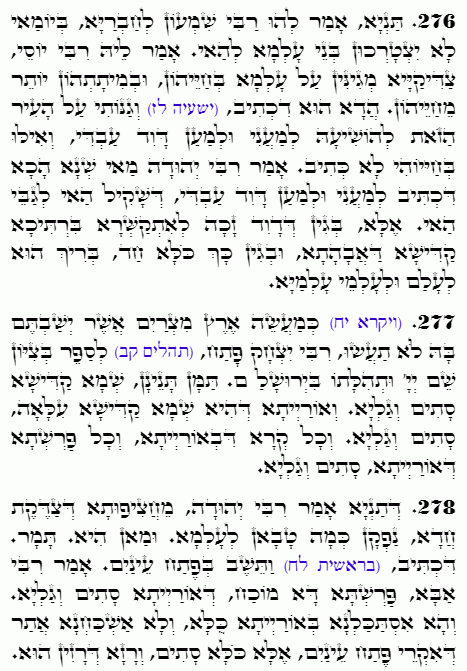Daily Zohar # 4670 – Acharei Mot – A place named “eyes”
Daily Zohar 4670

Hebrew translation:
277. כְּמַעֲשֵׂה אֶרֶץ מִצְרַיִם אֲשֶׁר יְשַׁבְתֶּם בָּהּ לֹא תַעֲשׂוּ. רַבִּי יִצְחָק פָּתַח, (תהלים קב) לְסַפֵּר בְּצִיּוֹן שֵׁם ה’ וּתְהִלָּתוֹ בִּירוּשָׁלִָם. שָׁם שָׁנִינוּ, הַשֵּׁם הַקָּדוֹשׁ נִסְתָּר וְנִגְלֶה. וְהַתּוֹרָה, שֶׁהִיא הַשֵּׁם הַקָּדוֹשׁ הָעֶלְיוֹן, נִסְתֶּרֶת וְנִגְלֵית. וְכָל פָּסוּק שֶׁבַּתּוֹרָה, וְכָל פָּרָשָׁה שֶׁל הַתּוֹרָה, נִסְתָּר וְנִגְלֶה.
278. שֶׁלָּמַדְנוּ, אָמַר רַבִּי יְהוּדָה, מֵחֻצְפָּתָהּ שֶׁל צַדִּיקָה אַחַת יָצְאוּ כַּמָּה טוֹבוֹת לָעוֹלָם, וּמִי הִיא? תָּמָר, שֶׁכָּתוּב (בראשית לח) וַתֵּשֶׁב בְּפֶתַח עֵינַיִם. אָמַר רַבִּי אַבָּא, פָּרָשָׁה זוֹ מוֹכִיחָה שֶׁהַתּוֹרָה נִסְתֶּרֶת וְנִגְלֵית. וַהֲרֵי הִסְתַּכַּלְתִּי בְּכָל הַתּוֹרָה וְלֹא מָצָאתִי מָקוֹם שֶׁנִּקְרָא פֶּתַח עֵינַיִם, אֶלָּא הַכֹּל נִסְתָּר, וְסוֹד הַסּוֹדוֹת הוּא.
.
Zohar Acharei Mot
Continued from previous DZ
#276
We have learned that Rabbi Shimon told the friends, “In my days, the people of the world will not need this—to bring the Torah scroll out into the street.”
Rabbi Yossi said, “The Tzadikim protect the world during their lifetimes and even more so after their death. As it is written,
Isaiah 37:35
“וְגַנּוֹתִי עַל הָעִיר הַזֹּאת לְהוֹשִׁיעָהּ לְמַעֲנִי וּלְמַעַן דָּוִד עַבְדִּי.”
“‘For I will defend this city, to save it For My own sake and for My servant David’s sake.'”
Yet, this was not written during David’s lifetime.
Rabbi Yehuda asked, “What is the difference here that it is written, ‘for My own sake and for the sake of My servant David,’ equating one with the other?” And he answered, “Rather, because David merited being connected with the holy chariot (Merkavah) of the Patriarchs, he is the fourth among them, which is the secret of Malchut. Therefore, all is one.
Notes:
The Tzadikim have a powerful protective effect on the world, both in life and after death. Rabbi Shimon emphasizes that his merit shields the generation from needing extraordinary measures to invoke Hashem’s mercy. The discussion about King David illustrates how an individual Tzadik can become integrated with the Holy Chariot. Their merit is everlasting and closely aligned with the Creator’s purpose. The unity of the Tzadikim with Hashem by adhering to the Torah brings about protection and salvation for the world, reflecting the profound impact of righteousness.
#277
Leviticus 18:3
“כְּמַעֲשֵׂה אֶרֶץ מִצְרַיִם אֲשֶׁר יְשַׁבְתֶּם בָּהּ לֹא תַעֲשׂוּ וּכְמַעֲשֵׂה אֶרֶץ כְּנַעַן אֲשֶׁר אֲנִי מֵבִיא אֶתְכֶם שָׁמָּה לֹא תַעֲשׂוּ וּבְחֻקֹּתֵיהֶם לֹא תֵלֵכוּ.”
“According to the doings of the land of Egypt, where you dwelt, you shall not do; and according to the doings of the land of Canaan, where I am bringing you, you shall not do; nor shall you walk in their ordinances.”
Rabbi Yitzchak opened with the verse:
Psalms 102:22
“לְסַפֵּר בְּצִיּוֹן שֵׁם יְהוָה וּתְהִלָּתוֹ בִּירוּשָׁלָ͏ִם.”
“To declare the name of YHVH in Zion, And His praise in Jerusalem.”
He said, we have learned: The Holy Name is both concealed and revealed. The concealed name is יהוה YHVH, and the revealed name is אדני Adonai. Similarly, the Torah, the supreme Holy Name of Zeir Anpin, is concealed and revealed. Every verse in the Torah and every section in the Torah is both hidden and revealed—that is, it has a literal meaning (פשט) and a secret meaning (סוד).
#278
Rabbi Yehuda said: From the boldness of one righteous woman, many good things came into the world. And who is she? She is Tamar, as it is written, “וַתֵּשֶׁב בְּפֶתַח עֵינַיִם” “She sat at the entrance of Enaim (lit. ‘עֵינַיִם’ ‘the opening of the eyes’).” (Genesis 38:14) Rabbi Abba said: This section proves to us that the Torah is both concealed and revealed, having both a literal and hidden meaning. For I have looked throughout the entire Torah and have not found any place named “עֵינַיִם” “Enaim.” Rather, everything is concealed, and this one is a secret of secrets.
Notes:
Rabbi Abba notes that, upon examining the Torah, there is no literal place called “עֵינַיִם” “Enaim.” This suggests that the name is symbolic rather than a physical location. The term “Enaim” (eyes) is tied to the idea of perception, vision, and spiritual insight.
The phrase “the opening of the eyes” likely refers to an opening of spiritual awareness or understanding, where deeper truths become visible.
This passage highlights the importance of understanding the Torah on its surface level and delving into its deeper, spiritual meanings. Tamar’s story becomes a gateway for exploring how hidden layers of wisdom are embedded within the Torah, revealing that even seemingly straightforward narratives carry profound spiritual lessons.
{||}

 Previous: Acharei Mot
Previous: Acharei Mot

